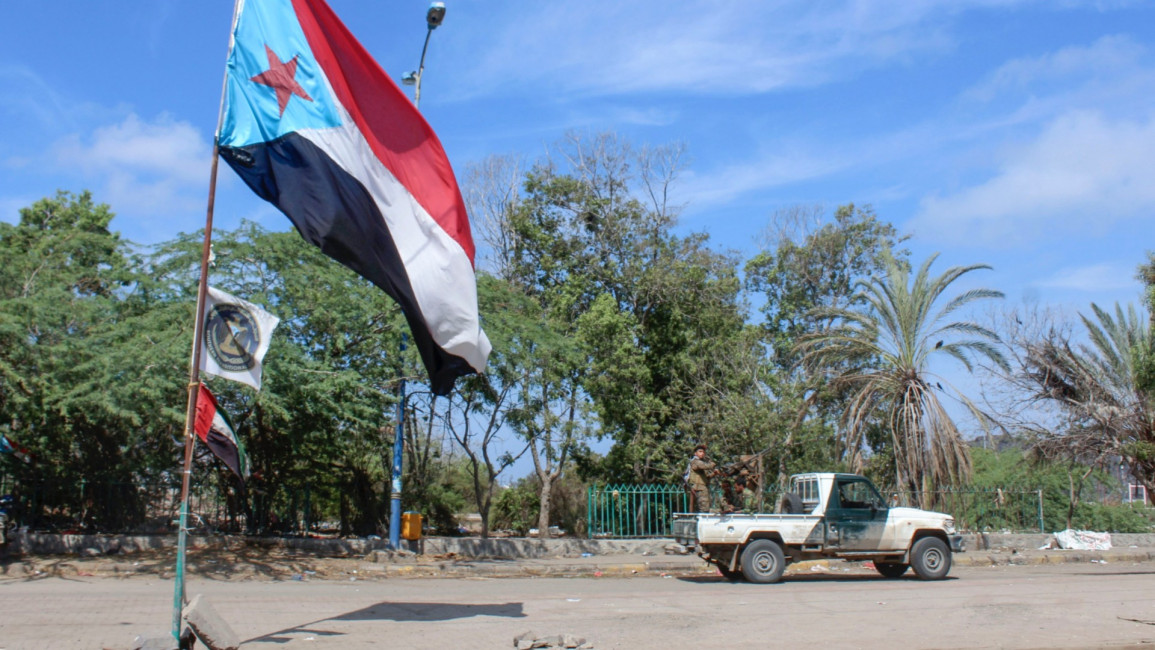Yemen's separatists ignore UAE backers, declare their secession 'irreversible'
The UAE-backed STC said it was “prepared to face the worst and irreversible possibilities of self-governance,” according to a report by Arabi21, citing a leader in the group.
We have a great responsibility ahead of us to implement the decision as required, and we are prepared for the worst,” Abdullah Mahdi Saeed, head of the STC’s Al-Dhale’ governate said.
“Today we are facing many enemies from multiple directions and we have a duty to our people,” he added, noting the decision to self-govern came after number provocations by Yemen’s internationally-recognised government against “the southern people.”
Read also: Saudi Arabia's faltering divide and rule strategy in Yemen
Abedrabbo Mansour Hadi’s government has been “intentionally starving and subjugating southerners by degrading public services,” in a move that he described as “torture”.
The announcement came as a result of "the government's delay and its evasion of the implementation of the Riyadh Agreement, as well as the lack of positive engagement regarding calls to improve living conditions,” he added.
The accusations followed a statement by the Saudi-led coalition in which it condemned the STC for its actions, which the ally described as “escalatory”.
The United Arab Emirates, a pivotal player in the Saudi-led coalition, has also distanced itself from the move despite backing, funding and training STC forces since the conflict erupted in 2015.
Twitter Post
|
"We stress the need to restore conditions to their previous state in the interim capital Aden," the Saudi-led coalition said according to tweets from the official Saudi Press Agency.
"Following the surprising announcement of a state of emergency by the Southern Transitional Council, we re-emphasise the need to promptly implement the Riyadh Agreement," it added.
Yemen's separatists signed a power-sharing deal in Riyadh last November that quelled a battle - dubbed a "civil war within a civil war" - for the south that had in August seen them seize control of the second city of Aden.
The Riyadh pact had been hailed as averting the complete break-up of the country, but with a lack of implementation, observers have said it is effectively defunct.
Yemen’s internationally-recognised government has also condemned the move and said the separatists - who have long agitated for independence in the south - would be responsible for the "catastrophic and dangerous" outcome.
The breakdown between the one-time allies comes as a Saudi-led coalition, which backs the internationally recognised government in a battle against the Houthi rebels, has extended a unilateral ceasefire aimed at fending off the coronavirus pandemic - a move rejected by the Houthis.
The political landscape in the south is complex, and despite the STC's declaration some southern cities, including Socotra, Al-Mahrah and Hadramout, said they did not recognise the call to self-rule and would remain aligned with the central government.
More than 100,000 have been killed since the Saudi-led coalition intervened five years ago to back the internationally-recognised government of Abedrabbo Mansour Hadi against the rebels.
Read also: Yemen in Focus: PM appeals for assistance after 'disastrous' Aden flooding
The STC’s announcement came after at least 21 people were killed in flash flooding this month, with Aden's streets submerged and homes destroyed.
The UAE, like the STC, has a zero tolerance policy towards the Muslim Brotherhood and Yemen's Brotherhood-influenced Al-Islah party, which has representatives in the internationally recognised government.
The tussle for control of the south, including the deadly clashes that broke out between Saudi-backed government and UAE-backed STC forces who seized control of Aden last year, exposed divisions between the coalition partners.
While the government and the STC are technically allies in the long war against the Houthis, the secessionists believe the south should be an independent state - as it was before unification in 1990.
Follow us on Facebook, Twitter and Instagram to stay connected



